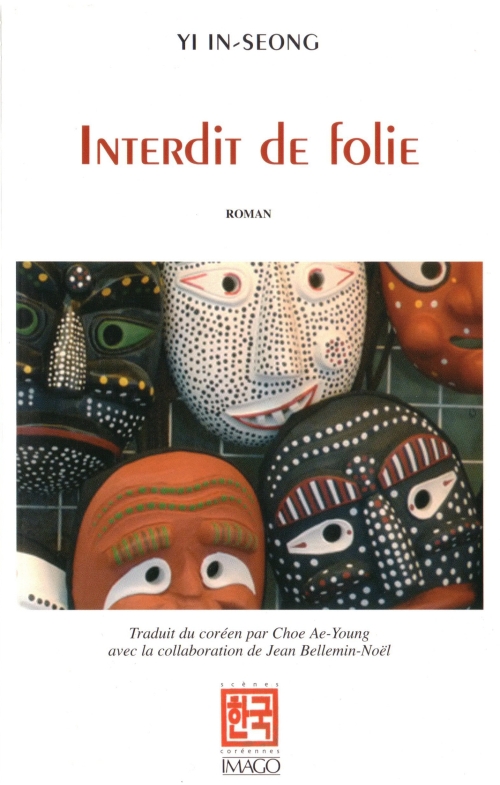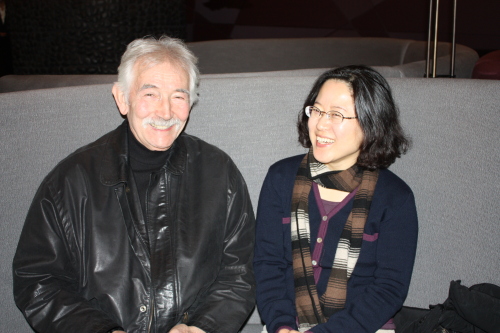Korean-French translators Choe Ae-young and Jean Bellemin-Nol first met as graduate student and professor at Paris 8 University back in 1988. About 20 years later, they are now a successful team of translators with an original methodology of their own.
On Friday, Choe and Bellemin-Nol jointly received the 18th Daesan Literary Award for their latest collaborative Korean-French translation work, “Interdit de Folie (Wanting to Go Insane, Yet Unable),” a full-length novel by Korean author Yi In-seong. An extremely experimental literary work, the original text tells the story of a severely traumatized Korean man in the 1980s who suffers from painful personal memories to a degree that he’d rather lose his sanity.
“I believe translators live upon writers and I feel grateful,” said Choe at the ceremony which was held at Seoul Press Center in Central Seoul. “I wanted to win this award not because of my personal ambitions, but because I’ve been hoping that my co-translator, who is also a long-time teacher of mine, to receive such honor for his great, much deserved work.”
On Friday, Choe and Bellemin-Nol jointly received the 18th Daesan Literary Award for their latest collaborative Korean-French translation work, “Interdit de Folie (Wanting to Go Insane, Yet Unable),” a full-length novel by Korean author Yi In-seong. An extremely experimental literary work, the original text tells the story of a severely traumatized Korean man in the 1980s who suffers from painful personal memories to a degree that he’d rather lose his sanity.
“I believe translators live upon writers and I feel grateful,” said Choe at the ceremony which was held at Seoul Press Center in Central Seoul. “I wanted to win this award not because of my personal ambitions, but because I’ve been hoping that my co-translator, who is also a long-time teacher of mine, to receive such honor for his great, much deserved work.”

“Interdit de Folie” is one of three Korean novels the two have worked together to translate. While native Korean Choe studied French literature at Seoul National University and Paris 8 University, Bellemin-Nol has almost no knowledge of the Korean language. In fact, he’d hardly read any Korean fiction until Choe, who had been fascinated by the original text, showed him her first translated draft of Yi In-seong’s “Saisons D’exil (Into Strange Times) in 2000.” It was Yi who also wrote “Interdit de Folie”. “Saisons D’exil” later became Choe and Bellemin-Nol’s first collaborative translation work.
Bellemin-Nol, who has done much research on Freudian psychology along with French literature, was deeply moved by Yi’s work that displayed a shockingly experimental use of language in dealing with complex states of human psychology. “Yi’s writing is profoundly original, almost incomparable to any other writers,” Bellemin-Nol told The Korea Herald on Saturday. “His text is rich enough to trigger many discussions from a Freudian perspective, regardless of any national, cultural barriers of the participants.”
Together, the two have developed an original, effective process of co-translating. First, Choe translates the entire Korean text to French, with a long list of footnotes that contain explanations of cultural context, synonyms of major words, and alternative ways of interpreting the text. Bellemin-Nol then revises the first draft and rewrites the text into more refined French, taking Choe’s footnotes into consideration. Then the “talk” begins. “From this stage we wouldn’t use my first translated draft at all,” Choe said. “We’d discuss extensively comparing the original Korean text and the second translated version which has been revised by Dr. Bellemin-Nol, for the final copy that would compromise the two drafts.”

Bellemin-Nol said though the two discuss their work in a “cheerful mood” 90 percent of the time, the mood can get very tense for the remaining 10 percent. “I try to keep the original context of the Korean text as much as possible while Dr. Bellemin-Nol brings the perspective of French readers,” Choe explained. “This process requires a lot of compromising and tough decisions.”
Aside from the translation works, Bellemin-Nol recently published a collection of his critical reviews on Korean literature, “Impact and Sympathy.” He has been writing literary reviews on works by Korean authors, including Choi In-hoon and Kim Young-ha, ever since his introduction to Korean literature by Choe in 2000. Since then, he has been reading and studying Korean novels relying on their French-translated versions. Originally written in French, the book has been translated into Korean by Choe.
“I find it interesting how Korean literature very often shows the co-existence of two opposite extremes,” Bellemin-Nol said. “It contains a very tender, emotional side, while it can be extremely powerful and explosive at the same time.”
Bellemin-Nol found such qualities in Korean culture as well. “The Korean society can be very hierarchal and values formality,” he said. “But once you get out of that social setting, the street crowd wouldn’t apologize even if they hit you as you walk by accident.”
The two are currently translating their fourth book, “Father’s Land” by author Im Chul-woo, under the official request of the Korea Literature Translation Institute. “Korean literature in the 1980s was, arguably, focused more on problems of society than literary expressions,” Choe said. “Yet Im’s work was an exception ― he’d put a lot of effort into his style of writing.”
Choe, who has also translated works of renowned French writers, including Emile Zola and Jean-Marie Gustave Le Clzio, said the translation work ― both French to Korean and Korean to French ― has made her realize she is, after all, Korean. “When I translate French text into Korean, I feel more control in the translated text,” she said. “But when I translate Korean text into French, it becomes a more objective and analytical process.”
Along with Choe’s apparent respect for her long-time teacher, Bellemin-Nol also expressed his genuine gratitude. “I am lucky,” he said, “to have been introduced to Korean literature by Choe and to work with her.”
By Claire Lee (clairelee@heraldcorp.com)


















![[Today’s K-pop] Treasure to publish magazine for debut anniversary](http://res.heraldm.com/phpwas/restmb_idxmake.php?idx=642&simg=/content/image/2024/07/26/20240726050551_0.jpg&u=)